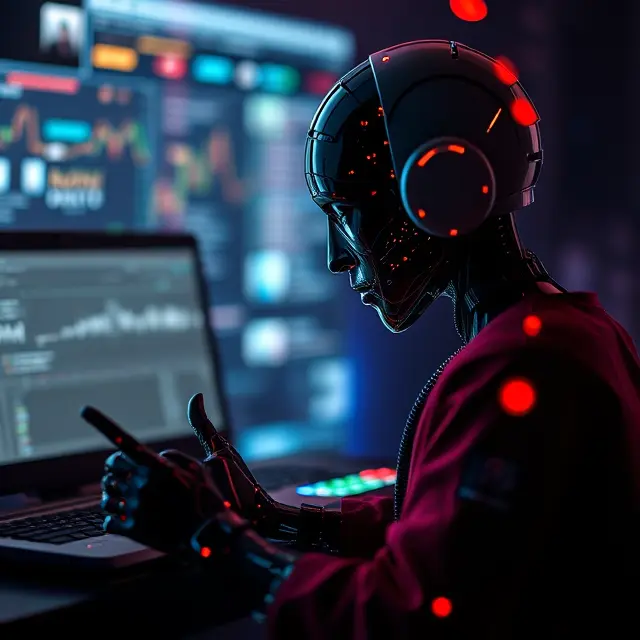
Exploring the Role of Artificial Intelligence in Music Composition and Production
Table of Contents
ToggleThe AI Muse: Exploring the Role of Artificial Intelligence in Music Composition and Production
Artificial Intelligence (AI) has rapidly evolved, transforming industries worldwide, and the music industry is no exception. Traditionally, music creation and production relied solely on human creativity, intuition, and skill. However, with the advancement of AI technologies, machines are now capable of composing music, enhancing production quality, and even collaborating with human artists. This article explores how AI is reshaping music composition and production, its benefits and challenges, and what the future holds for this innovative integration.
The Evolution of AI in Music
The journey of AI in music began decades ago, but recent technological advancements have accelerated its progress. Early computer-generated music experiments in the 1950s laid the foundation for today’s sophisticated AI music systems. Today, AI can analyze massive datasets of musical compositions, understand patterns, and generate original pieces that rival human-made music.
Milestones in AI Music Development
- 1957: Lejaren Hiller and Leonard Isaacson created the first computer-generated music using the ILLIAC computer.
- 1980s: Algorithmic composition tools emerged, aiding composers in music creation.
- 2016: Sony’s Flow Machines project produced “Daddy’s Car,” a pop song inspired by The Beatles, showcasing AI’s creative capabilities.
- 2020s: Platforms like AIVA and Amper Music empower users to compose music without formal training.
How AI Composes Music?
AI music composition involves using algorithms and machine learning to analyze existing music and generate new compositions. These systems learn from vast libraries of music, recognizing patterns in melody, harmony, rhythm, and structure. They then apply this knowledge to create original pieces.
Key Processes in AI Music Composition
- Data Collection and Analysis: AI systems gather and analyze extensive music datasets, studying various genres, instruments, and styles.
- Pattern Recognition: Advanced algorithms detect and understand common musical structures and trends.
- Composition Generation: AI creates original music by blending learned patterns with user inputs or predefined parameters.
- Feedback Loop: AI models refine their outputs based on feedback, continuously improving their compositions.
How AI Is Transforming Music Composition?
AI’s ability to compose music is one of its most groundbreaking applications. By analyzing vast datasets of musical compositions, AI systems can learn patterns, styles, and structures, enabling them to generate original pieces of music. These capabilities are helping musicians and producers break creative boundaries and explore uncharted territories.
1. Automated Composition
AI-powered tools can generate music tailored to specific moods, genres, or themes. This is achieved by training algorithms on diverse musical datasets. For instance, an AI music generator can compose melodies or harmonies in real time, serving as a valuable tool for composers seeking inspiration or assistance.
2. Enhancing Creativity
Far from replacing human creativity, AI acts as a collaborator. Musicians can use AI to spark ideas, develop compositions, or even add unique elements to their work. By automating routine aspects of music creation, AI allows artists to focus on the emotional and conceptual aspects of their craft.
3. Adapting to Individual Preferences
AI can also personalize music composition based on individual preferences. By analyzing user inputs and feedback, AI systems can create custom compositions that resonate with listeners on a personal level, enhancing their connection to the music.
The Role of AI in Music Production
AI is not only revolutionizing how music is composed but also how it is produced. From audio editing to mastering, AI-driven tools are making music production faster, more efficient, and accessible to creators of all skill levels.
Audio Enhancement and Editing
AI-powered software can automate tasks like noise reduction, pitch correction, and audio restoration. This technology ensures high-quality sound production, even for creators with limited technical expertise. Advanced AI tools can also isolate specific instruments or vocals from recordings, making remixing and sampling easier than ever.
Music Mastering
Mastering is a crucial step in music production, and AI is streamlining this process. AI-driven mastering tools analyze tracks and make adjustments to ensure they meet professional standards. These tools are particularly beneficial for independent artists, providing them with high-quality results without the need for expensive studio equipment.
Virtual Instruments and Sound Design
AI-powered virtual instruments can emulate the sound of traditional instruments or create entirely new sounds. These tools expand the palette of sounds available to musicians, enabling them to experiment and innovate with ease.
AI’s Impact on the Music Industry
The integration of AI into the music industry is transforming every aspect of the ecosystem, from how music is created to how it is marketed and consumed. Here are some of the key areas impacted by AI:
Personalized Music Recommendations
AI algorithms power the recommendation systems of streaming platforms like Spotify and Apple Music. By analyzing listening habits, these systems suggest songs, albums, and playlists tailored to individual tastes, enhancing the user experience and discovery process.
Live Performance Enhancements
AI is making live performances more dynamic and interactive. From visual effects synchronized to the music to AI-driven sound systems that adapt to the acoustics of a venue, technology is enhancing the live music experience for both artists and audiences.
Content Creation for Media
AI-generated music is increasingly being used in media such as advertisements, films, and video games. For instance, AI video generator apps can now integrate custom AI-composed tracks directly into video content. These applications analyze the visual elements of a video, such as pacing, tone, and emotion, to generate music that perfectly aligns with the narrative. This ensures a seamless audio-visual experience, elevating the overall impact of the content.
Ethical and Creative Considerations
While AI offers numerous benefits to the music world, it also raises ethical and creative concerns that need to be addressed to ensure its responsible use.
Authorship and Copyright
AI-generated music poses questions about authorship and intellectual property. Who owns the rights to a piece of music created by an AI system—the developer, the user, or the AI itself? Establishing clear legal frameworks is essential to navigating these complexities.
Preserving Human Touch
Critics argue that AI-generated music may lack the emotional depth and nuance that comes from human experience. Striking a balance between AI’s efficiency and human artistry is crucial to maintaining the soul of music.
Data Bias and Diversity
AI systems learn from the data they are trained on, which means they can inherit biases present in those datasets. Ensuring diversity in training data is vital to preventing homogenization in AI-generated music and promoting creativity across genres and cultures.
Future Trends in AI and Music
As AI technology continues to advance, its influence on music composition and production is set to grow even further. Here are some trends to watch:
Real-Time Collaboration
AI-powered tools are making real-time collaboration between artists and AI systems a reality. Musicians can experiment with ideas, refine compositions, and produce tracks in partnership with AI, creating a seamless creative process.
Adaptive Music in Gaming and VR
The gaming and virtual reality industries are exploring the use of AI-generated music that adapts to player actions or environmental changes. This creates a more immersive experience, blurring the lines between music and interactivity.
Educational Applications
AI is also being integrated into music education, providing personalized learning experiences. From interactive tutorials to virtual music coaches, AI is helping aspiring musicians hone their skills and expand their knowledge.
Expanding Accessibility
By simplifying complex aspects of music production, AI is making the art form more accessible to a wider audience. This democratization of music creation allows individuals from diverse backgrounds to participate in the creative process.
Conclusion: Role of Artificial Intelligence in Music Composition and Production
Artificial Intelligence is reshaping the landscape of music composition and production in profound ways. By enhancing creativity, streamlining production processes, and personalizing experiences, AI is opening new doors for artists, producers, and audiences alike. While challenges related to ethics and creativity remain, the potential of AI to transform the music world is undeniable. As technology and artistry continue to converge, the future of music promises to be a harmonious blend of human ingenuity and artificial intelligence.
FAQs: Role of Artificial Intelligence in Music Composition and Production
Below are some go the FAQs about Role of Artificial Intelligence in Music Composition and Production.
What is the role of artificial intelligence in music composition?
AI Music Composition analyzes a large amount of musical data using cutting-edge technology like neural networks and machine learning. This aids AI in analyzing the complex melodies, rhythms, and harmonies that contribute to the popularity of music.
How can AI be used in music production?
With AI, composers and musicians can create material in a matter of seconds, create voices that sound like they were recorded, split apart pieces on a single recording, and much more. AI was mostly restorative rather than generating in the context of The Beatles’ “Now And Then.”
What is the difference between music production and music composition?
Students majoring in studio composition concentrate on the craft of composition, while those majoring in studio production take a more technical approach, concentrating on technology, sound manipulation, and other aspects of recording studio operations.
What are the four basic of music composition?
The Four Foundations of Composition in Music. Understanding the four fundamentals of music composition is necessary to produce beautiful music. Melody, harmony, rhythm, and shape are these four essentials.
What is the basic role of artificial intelligence?
To put it briefly, artificial intelligence aims to create software that can reason with input and deliver explanations with output.
You May Also Like

Top 5 Common FASTag Recharge Problems and How to Solve Them
12 December 2024
Soccer Streams: How to Watch Matches Safely with the Best Legal Services
5 February 2025

